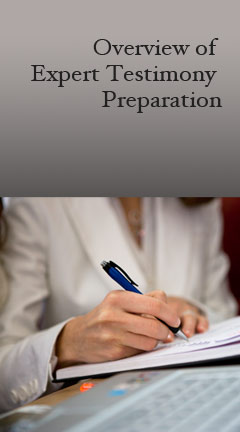Archival Notice
This is an archive page that is no longer being updated. It may contain outdated information and links may no longer function as originally intended.
Home | Glossary | Resources | Help | Course Map
The expert may be called on to testify:
- At depositions.
- At hearings, including pretrial hearings.
- In open court:
- Direct examination (questions from the retaining lawyer).
- Cross-examination (questions from the opposing lawyer).
The expert witness should know what to expect in the deposition, at pretrial hearings and during testimony. Anticipate and be prepared for general and specific questions from the opposing counsel. (See: Depositions.)
Final trial preparation involves fine-tuning everything the expert knows about the case and sharpening the expert's skills for credible presentation. Organization of materials, staging, timing, bearing, dress and demeanor all assist in the presentation preparation the expert undergoes before trial (See: Pretrial).
Expert testimony is more interesting and understandable if graphs, charts, drawings, models, demonstrations and similar projections are used. These presentation and teaching visual aids are known as demonstrative materials.
The expert must be creative when planning how to demonstrate investigation, testing, and conclusions. Remember that about 85 percent of what people learn is by observation, and about 15 percent is learned by listening.
The expert's direct examination during trial or hearing presents a major opportunity to present credible, persuasive, and clearly understood opinions and conclusions concerning the matter at issue. During direct examination, the expert will be asked semi-routine questions, such as identifying oneself and sharing background and qualifications that qualify the expert to render opinions as to cause and effect in the disputed matter.
The expert's presentation will include investigation, evidence testing, the standards, protocols or texts on which the expert relied, and findings of fact. From those findings, the expert will then be asked to render opinions supported by reasoning, scientific evidence, and logical interrelationships among the facts found and the conclusions reached (see Trial).
Cross-examination affords the expert witness a significant intellectual challenge. The expert may be called upon to retrace steps, explain and justify a position, and even harmonize views in the case with prior writings, depositions or trial testimony in other matters. Cross-examination actually presents an opportunity to solidify and drive home the conclusions and opinions the expert had previously stated and had testified to on direct examination (see Trial, Cross-Examination).
The skilled forensic expert must be sensitive to ethical issues and potential conflicts that are inherent to the process. The expert should have a clear sense of what is professionally proper, allowed and allowable. An awareness of interprofessional codes and ethical standards of conduct will help guide the expert through intricacies of the forensic testimony process (see Ethics for Experts).
Additional Online Courses
- What Every First Responding Officer Should Know About DNA Evidence
- Collecting DNA Evidence at Property Crime Scenes
- DNA – A Prosecutor’s Practice Notebook
- Crime Scene and DNA Basics
- Laboratory Safety Programs
- DNA Amplification
- Population Genetics and Statistics
- Non-STR DNA Markers: SNPs, Y-STRs, LCN and mtDNA
- Firearms Examiner Training
- Forensic DNA Education for Law Enforcement Decisionmakers
- What Every Investigator and Evidence Technician Should Know About DNA Evidence
- Principles of Forensic DNA for Officers of the Court
- Law 101: Legal Guide for the Forensic Expert
- Laboratory Orientation and Testing of Body Fluids and Tissues
- DNA Extraction and Quantitation
- STR Data Analysis and Interpretation
- Communication Skills, Report Writing, and Courtroom Testimony
- Español for Law Enforcement
- Amplified DNA Product Separation for Forensic Analysts


